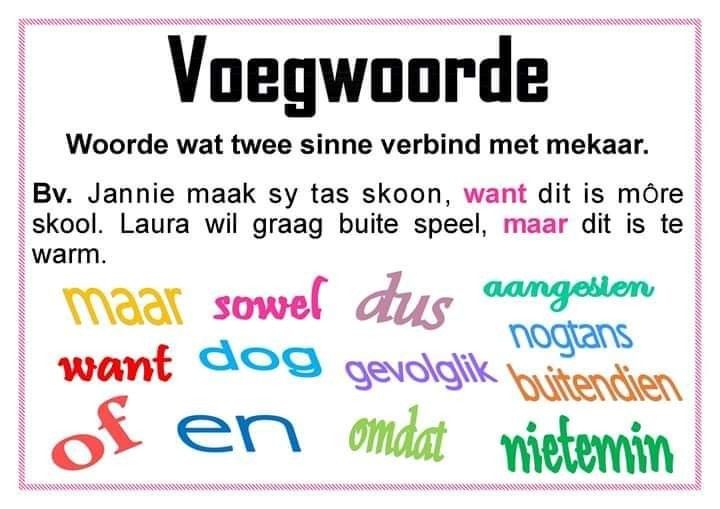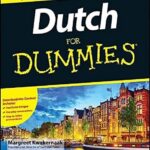Dutch Prefixes and Conjunctions: a worksheet on seperable and inseperable prefixes, conjuncions and relative pronouns with some exercises
Dutch Prefixes and Conjunctions
Separable Prefixes
| aan- | af- | binnen- | in- | na- | onder- | over- | toe- | voor- |
| achter- | bij- | door- | mee- | om- | op- | tegen- | uit- | -weg |
When verbs with separable prefixes are conjugated, the prefixes go to the end of the clause or sentence. For example, uitgaan (to go out) and weggaan (to go away):
Gaan jullie niet meer uit? Don’t you go out anymore?
Hij gaat vandaag weg. He’s going away today.
Inseparable Prefixes
| be- | ont- | ge- |
| her- | ver- | er- |
These prefixes always remain attached to their infinitives. The inseparable prefixes are unstressed syllables, as compared to the separable prefixes, of which most can stand alone as prepositions. -ann, -onder, -over, -door, -voor and -om can also be inseparable prefixes if they are unstressed.
The prefix of a separable compound verb is sometimes attached to, and sometimes separated from its verb. In the chapter about separable compound verbs, you can read about the situations in which the prefix and verb are separated. In this section, we are more concerned about the position of the prefix when it appears as a separate word.
As you can see in the graph below, the prefix immediately precedes the OV.
As long as the prefix remains attached to its verb, we will not encounter any problems placing it. The prefix remains part of its verb if the verb has the form of an infinitive or past participle. The infinitive and past participle can only be used in the OV. Recall, that in the FF they are always conjugated in the simple present or simple past.
Infinitive:
| Left | Middle | Right |
| De tulpen zullen | ontzettend veel water | opnemen |
| The tulips will absorb a lot of water. |
Past participle:
| Left | Middle | Right |
| De tulpen hebben | heel veel water | opgenomen |
| The tulips have absorbed a lot of water. |
There are two cases where the PF is separated from its verb:
- The separable compound verb is the finite verb
- The separable compound verb is part of the OV that contains more than one verb
Dutch Prefixes and Conjunctions: Coordinating Conjunctions
The most simple way to join two sentences, is using a coordinating conjunction, because the word order will not change then. For example, place en (and) between the sentences.
Imagine the following situation, first described in two short sentences, and then described in a long one:
Hij wil naar huis. – He wants to go home.
Hij heeft geen geld. – He has no money.
Hij wil naar huis en hij heeft geen geld. – He wants to go home and he has no money.
You can replace the word en by other coordinating conjunctions: maar (but), want (because), dus (so the conclusion is), and of (or). Don’t forget to add a comma where it is needed.
Hij wil naar huis en hij heeft geen geld. – He wants to go home and he has no money.
Hij wil naar huis, maar hij heeft geen geld. – He wants to go home, but he has no money.
Hij wil naar huis, want hij heeft geen geld. – He wants to go home, because he has no money.
Hij wil naar huis, dus hij heeft geen geld. – He wants to go home, so he has no money.
Hij wil naar huis of hij heeft geen geld. – He wants to go home or he has no money.
The word maar in two additional examples. Note the word order, which is normal.
Ik heb de moersleutel nodig. – I need the spanner.
Die is kwijt. – It is lost.
Ik heb de moersleutel nodig, maar die is kwijt. – I need the spanner, but it is lost.
Ik kom deze week. – I’ll come this week.
Ik kom vandaag niet. – I won’t come today.
Ik kom deze week, maar ik kom vandaag niet. – I’ll come this week, but I won’t come today.

Dutch Prefixes and Conjunctions: Subordinating Conjunctions
Subordinating conjunctions change the word order of the second short sentence, that is used to compound the long sentence.
The word omdat means because. Use want (because) if you don’t want the word order to change.
You can see below that the word order of the second sentence is changed, when it is joined to the first by omdat.
The verb heeft (has) moves to the last position of the sentence. This does not happen in English.
Hij wil naar huis. – He wants to go home.
Hij heeft geen geld. – He has no money.
Hij wil naar huis, omdat hij geen geld heeft. – He wants to go home, because he has no money.

You can replace omdat by aangezien. Both mean because. Aangezien is used less frequent.
Hij wil naar huis, aangezien hij geen geld heeft. – He wants to go home, because he ran out of money.
Hoewel means although. It is used to mention an argument that is ignored.
We join the next two sentences:
Ik ga niet surfen. – I’m not going to surf.
Het is zondag. – It is Sunday.
Ik ga niet surfen, hoewel het zondag is. – I’m not going to surf, although it is Sunday.
The word als (if) is used to mention a condition that must be met.
We join the next two sentences:
Ik ga niet surfen. – I’m not going to surf.
Het is windstil. – There is no wind.
Ik ga niet surfen, als het windstil is. – I’m not going to surf, when there is no wind.
The word tenzij (unless) is the opposite of als. If we take the previous sentence and adapt it, we must leave out the word niet (not) to get a logical sentence.
Ik ga surfen, tenzij het windstil is. – I’m going to surf, unless there is no wind.
behalve als means unless. It is an alternative to tenzij.
Ik ga surfen, behalve als het windstil is. – I’m going to surf, unless there is no wind.
An alternative translation using the English word except is:
Ik ga surfen, behalve als het windstil is. – I’m going to surf, except when there is no wind.
toen means when.
Ik ging naar huis toen ik honger kreeg. – I went home when I got hungry.
You can start a sentence with toen. This kind of sentences is discussed later. More interesting is that although can be avoided. Look at the complicated word order of the hoewel-sentence.
Ik ga niet surfen, hoewel het zondag is. – I’m not going to surf, although it is Sunday.
And compare this to the easy maar-sentence, which means about the same.
Het is zondag, maar ik ga niet surfen. – It is Sunday, but I’m not going to surf.
Dutch Prefixes and Conjunctions: Time Conjunctions
Time conjunctions are subordinating conjunctions.
voordat means before.
Ik ging surfen. – I went surfing.
Ik had gegeten. – I had had a meal.
Ik ging surfen voordat ik had gegeten. – I went surfing before I had a meal.
Ik ging surfen voordat ik gegeten had. – I went surfing before I had a meal.
nadat means after.
Ik ging surfen nadat ik had gegeten. – I went surfing after I had a meal.
Ik ging surfen nadat ik gegeten had. – I went surfing after I had a meal.
na means after. If we use it instead of nadat we must change the sentence a little.
het eten (the meal) is informal for de maaltijd.
Ik ging surfen na het eten. – I went surfing, after the meal.
voor means before. The sentence has the same structure as a sentence with na.
Ik ging surfen voor het eten. – I went surfing before the meal.
Moving Subordinating Conjunctions to the Front
You can move a subordinating conjunction to the front. The second subsentence, that belongs to it of course, moves to the front also. The word order is quite different from what we have seen. Just look at the pattern to get used to it. If you make sentences yourself, you can probably avoid complexity like this.
Omdat hij geen geld heeft, wil hij naar huis. – Because he ran out of money, he wants to go home.
Aangezien hij geen geld heeft, wil hij naar huis. – Because he ran out of money, he wants to go home.
Hoewel het zondag is, ga ik niet surfen. – Although it is Sunday, I’m not going to surf.
Als het windstil is, ga ik niet surfen. – When there is no wind, I’m not going to surf.
Als het windstil is, dan ga ik niet surfen. – When there is no wind, then I’m not going to surf.
Tenzij het windstil is, ga ik surfen. – Unless there is no wind, I’m going to surf.
Behalve als het windstil is, ga ik surfen. – Unless there is no wind, I’m going to surf.
You can start a sentence with a time conjunction.
Voordat ik gegeten had, ging ik surfen. – Before I had a meal, I went surfing.
Nadat ik gegeten had, ging ik surfen. – After I had a meal, I went surfing.
Na het eten ging ik surfen. – After the meal, I went surfing.
Voor het eten ging ik surfen. – Before the meal I went surfing.
Toen ik honger kreeg, ging ik naar huis. – When I got hungry, I went home.
Coordinating Conjunctions are Easy Conjunctions
Conjunctions that do not disturb the word order are:
en – and
maar – but
want – because
dus – so
of – or
Just link two normal sentences by a conjunction like this (coordinating conjunctions). Then you will have a correct sentence without word order problems.
Sometimes it will also work if the second sentence is a question.
Hij is rijk. – He is rich.
Is hij intelligent? – Is he intelligent?
Hij is rijk, maar is hij intelligent? – He is rich, but is he intelligent?
A two questions example:
Is hij lang? – Is he tall?
Is hij kort? – Is he short?
Is hij lang of is hij kort? – Is he tall or is he short?
The previous sentence can be abbreviated this way:
Is hij lang of kort? – Is he tall or short?

Level
This lesson can be used for adults from elementary to intermediate levels.
Aim
The aim of this lesson is to learn the prefixes and conjunctions in Dutch
Preparation
First print out the worksheet, then copy a worksheet for each student in the class.
Procedure
Go through the grammar and exercises together.










